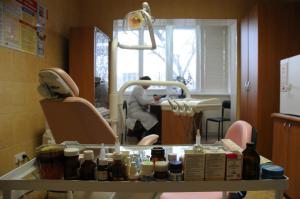Tanzania prioritizes delivery of oral health services at primary care level
Dar es Salaam ‒ One evening after work, 31-year-old Calvin Andrea went to the nearby Tumbi clinic in Kibaha Region, Tanzania, as he could not endure the severe tooth ache he was suffering. “To be honest, I was really sad about the discomfort I felt and the bad breath I was experiencing,” he says.
Andrea was surprised to consult with an oral health professional as he has in the past struggled to access these services. “After the swift response from the doctors, I am much better and happy and I have been relieved of the extreme pain,” he says.
He was fortunate to visit one of the primary care facilities in the country that currently offers oral health services. Only about 7% of primary care facilities in Tanzania provide oral health services. These include 184 district hospitals, 355 health centres and 10 dispensaries.
Many countries in the African region have limited oral health workforce. For instance, there are only 3.3 dentists for every 100 000 people (2014–2019), around one-tenth of the global ratio. In Tanzania, there are only 23% of the 191 dental specialists required and 39% of the required 979 dental surgeons, for example.
To improve oral health services, Tanzania is making a major, multifaceted push focusing on service delivery at the primary care level. At the heart of this initiative is the Universal Health Insurance Bill, which was signed into law at the end of 2023. The legislation protects the right to health services for all Tanzanians, regardless of their ability to pay, and includes oral health services.
According to Dr Nzobo Baraka, Chief Dental Officer and Assistant Director, Oral Health Services, in Tanzania’s Ministry of Health, with the advent of the bill, the country aims to expand oral health services to at least 20% of primary care facilities by 2030.
“This includes oral health promotion, oral disease prevention and control,” he says. “The bill is a milestone for oral health in Tanzania and is expected to improve the health and well-being of millions of people who suffer from oral diseases. It aligns with WHO’s vision of achieving universal health coverage for all and leaving no one behind.”
According to Tanzania’s most recent national oral health survey in 2020, half of all Tanzanian adults, and four out of every five children, have never visited a dentist, with more than three-quarters of all adults and 31% of children suffering tooth decay.
Andrea is one of the beneficiaries of the initiative to offer oral health to people who could not otherwise afford these services. “Thanks to my national health insurance, I received immediate assistance from an oral health professional,” says Andrea. He also avoided long queues and waiting times that he had previously experienced and is happy to have access to a primary care facility “24/7”, he says.
The country has trained and deployed dental therapists to health centres to enable access to oral health services at primary care level and reintroduced advanced diploma courses in clinical dentistry. In the African region, World Health Organization (WHO) has enrolled over 5700 community health workers and others, including in Tanzania, in an oral health online course, launched in 2023.
To further improve the country’s oral health outlook, the government is working on procuring and installing necessary dental equipment and other relevant medical items and making essential dental medicines broadly available, without incurring financial hardship.
“Historically, oral health was a neglected area, but since 2022 the government has prioritized the improvement of oral health services, by procuring equipment, items and supplies, and recruiting a number of oral health practitioners to all levels of care,” says Dr Omari Sukari, Regional Medical Officer for Tanzania’s Geita Region.
The move to increase facilities and human resources for oral health is coupled with other public health interventions, including the introduction of taxes on sugar-sweetened beverages and oral health promotion in critical settings. One example is school-based oral health promotion for primary school children, including healthy eating, low sugar intake and toothbrushing with fluoride toothpaste.
“In this situation, it is important to strengthen the oral health workforce by improving the capacity of mid-level oral healthcare providers, such as dental therapists and task-sharing among oral health and other health professionals, including community health workers,” explains Dr Yuka Makino, Technical Officer for Oral Health at WHO’s Regional Office for Africa.
Collaborating closely with the Ministry of Health, WHO country office in Tanzania has played a pivotal role in supporting initiatives targeting reduced consumption of sugary foods. The Organization has actively participated in major assessments, including the recently concluded STEPS survey, which collects national data on the risk factors associated with noncommunicable diseases. The survey includes a nationwide community assessment on oral health. An upcoming mid-term review of the Health Sector Strategic Plan will prioritize chronic diseases in its evaluation. WHO also aims to provide support to the development of an upcoming National Oral Health Strategy.
“I commend The United Republic of Tanzania for its recognition of the significance of addressing oral health as a vital aspect of ensuring a high quality of life for all Tanzanians,” says Dr Charles Sagoe-Moses, WHO representative in Tanzania. “I believe that the forthcoming results will be instrumental in determining the necessary health package for oral health and also enhance interventions as part of broader efforts to combat noncommunicable diseases.”
Communications Officer
WHO Country Office, United Republic of Tanzania
Tel: +255 744377899 (Phone)
Email: adjeidum [at] who.int (adjeidum[at]who[dot]int)
Communications and marketing officer
Tel: + 242 06 520 65 65 (WhatsApp)
Email: boakyeagyemangc [at] who.int (boakyeagyemangc[at]who[dot]int)
